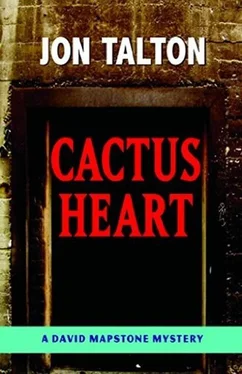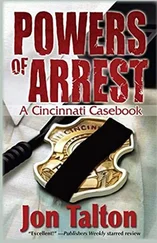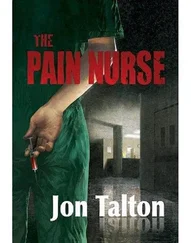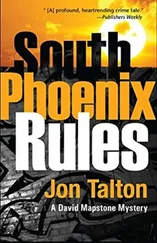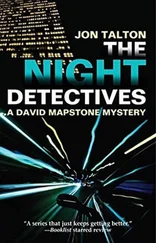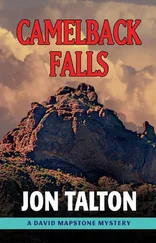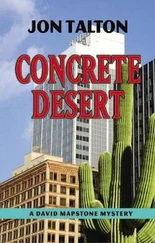She laughed. She had a big, fun laugh and it made me smile. She said, “I’m sorry, Deputy Mapstone. I know this seems absurd. You work around a company like Yarneco for enough years and you get paranoid. Yes, I know about the codicil. Working for Max meant that I did a good deal of work with the Yarnell Trust.”
I asked her about that. She ran a long finger around the rim of the cup in front of her.
“The trust supports twenty-seven heirs of Hayden Yarnell and his sister. I know, must be nice. Few of them live in Arizona any longer. Anyway, the trust is entirely funded by the wealth that Hayden Yarnell left, plus the investments made since then by the bank, advised by an independent board. Not even Max or James Yarnell were given seats on the board.”
“It doesn’t sound like Hayden Yarnell trusted his family.”
“He was a self-made man,” Megan said. “And I guess he saw what a little money and leisure time did to his son, Hayden Jr.”
“The one they called Win.”
“Right. Anyway, this always struck me as strange. But when I started dealing with trust business, I heard about this codicil. I thought it was just a family legend. But one day I was researching something, and there it was. If it turned out that any family member had conspired or participated in the abduction of his grandsons, the conditions of his bequests would change. Among other things, the trust would be liquidated and given to charity.”
“That sounds extreme.”
“It’s very odd,” she said. “Before I went to work at Yarneco, I had worked at a big law firm that did a lot of estate planning. I never saw anything like it before. Kind of like vengeance beyond the grave.”
“Did Max ever talk about this?”
“Never. The one time I asked, he got really flustered.”
“Did he talk about the kidnapping?”
“No. It was understood that we didn’t discuss it.”
“You were close to him?”
She flashed angry eyes at me; they were green. “Not what you think, deputy.”
“I didn’t think anything. I’m just trying to understand.”
She kept sipping the espresso, but the level of the liquid never seemed to go down. I needed to develop that technique with liquor. After a moment, “Max said his grandfather died a bitter, crazy old man. He said the codicil was a result of that. He also doubted it could even be enforced by a court.”
If that were true, it made me wonder why he became flustered, to use her word.
“Max wasn’t close to his brother?”
“You could say that. Or you could say they just despised each other. James still controlled a share of Yarneco-within the parameters of the trust, of course-and he would vote against Max, just for spite, it seemed to me. James lives in this art world. He’s very connected and handsome, charming in a way his brother never is. Was, I mean. He doesn’t know anything about business.”
By this time a tall, boy-faced man was hovering. He was dressed in an over-long T-shirt, baggy jeans and expensive sneakers. Megan excused herself without introducing me, and walked away with the fiancé. There was no time to ask why she felt paranoid working for Yarneco, or whether her boss had felt the same. There was barely time to appreciate her elegant beauty as she walked out with her slob boyfriend. I unconsciously straightened my suit coat and headed to the rain-anointed parking lot.
Choose a strand and pull it, follow where it led. That had been Gretchen’s advice. So on Tuesday I drove down Central into the south Phoenix barrio, across the Salt River that stayed dry despite the rain, past the brightly colored storefronts with signs in Spanish. A brave ice-cream man patrolled the corner of Southern Avenue with his pushcart, even though it was fifty degrees outside. Shops covered their wares in plastic against the rain. Working people huddled on the muddy, broken concrete of city bus stops.
Every face I saw was Hispanic, and it made me think of the kid in the old motel, Hector Gonzales. Just before Peralta arrived, when I had asked him if he had killed Yarnell, he said something odd. He said, “Yarnell, he…” I had forgotten about it in the mayhem that followed. Now I remembered it. “Yarnell, he…” He said it as if he knew whom I was talking about, and yet it wasn’t necessarily the way you’d begin a sentence of denial, or confession. “Yarnell, he…” Nothing about these cases seemed right. I was thinking too much, or so Peralta had said. So I drove on, but didn’t stop thinking.
The Phoenix I had grown up in had been little removed from its roots as a largely Southern town, and south Phoenix was the segregated wrong side of the tracks. It was a very Anglo city, with a relatively large African-American population, and Mexican-American families that had lived here for generations. All this had been swept away by the past ten or fifteen years, as hundreds of thousands of first-generation Latino migrants had crowded into a city whose population had tripled since 1960. The historic Golden Gate barrio had been bulldozed for Sky Harbor expansion. The newcomers had turned everything from the onetime white-bread suburb of Maryvale to many of the formerly black neighborhoods of south Phoenix into new barrios. Now the Midwesterners were coming, too. The citrus groves and Japanese Flower Gardens that had encircled the south edge of the city like a cooling, green necklace were falling to subdivisions, shopping strips, and gated properties. There were hard feelings and tensions on all sides.
I was after different history: a man who had been at the Yarnell hacienda the night of the kidnapping. Finding people was easier than when I had been a young patrol deputy. Now the department had a software program called AutoTrack that allowed us to search through public records using as little as a name. I had more than that, because Luis Paz’s Social Security number was still in the Yarneco records from 1941, and the Department of Motor Vehicles had issued him a driver’s license in 1988. But his old phone number had been disconnected. With AutoTrack I found he was still alive, and living with his son. I tried to keep my heart from leaping into my throat in excitement.
Luis Paz, Hayden Yarnell’s gardener, would be the only person left alive who had been an adult at the hacienda when the kidnapping took place. Although the case files showed that Paz was there that Thanksgiving night, there was no evidence he had been interviewed. Another case of lost paperwork, I was sure. But what if he had seen something that escaped the attention of young James or Max Yarnell? Maybe he could tell me what happened on the night when Jack Talbott was sleeping off a drunk, not committing a kidnapping. Or maybe Paz was in diapers with his memory gone. I had to try.
I parked the BMW in front of a single-story cinder block house on a street without curbs or gutters. Around me was a poor neighborhood hunched in the shadow of some kind of industrial operation. The air smelled of an unknown chemical. But this house was neat, freshly painted and lushly landscaped. I counted four pickup trucks in the driveway. At the door, I showed my star and asked for Luis Paz.
“He’s not here. Who the hell are you?”
A big man around my age pushed out the screen door. I backed away instinctively. He was taller than me, broad shouldered, and carried his arms in the way of weight lifters. Resentment shone on him like sweat. I didn’t know what flavor of resentment, but it didn’t take a Ph.D. to know it involved cops. I told him who I was.
“I’m investigating the kidnapping and murder of Andrew and Woodrow Yarnell. I know that happened a long time ago. But our information is that your…grandfather?…was there the night it happened.”
“He’s my grandfather. He doesn’t know anything.” His voice was low and decidedly unfriendly.
Читать дальше
